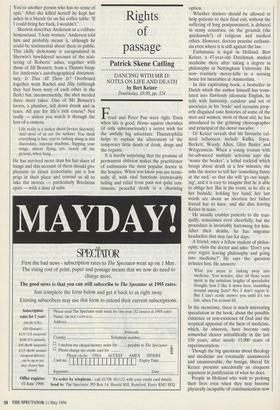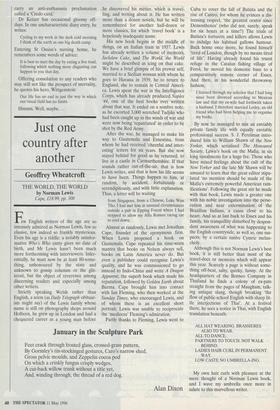Rights of passage
Patrick Skene Catling
DANCING WITH MR D: NOTES ON LIFE AND DEATH by Bert Keizer Doubleday, £9.99, pp. 324 Feud and Peter Pan were right. Even when life is good, Homo sapiens cherishes (if only subconsciously) a secret wish for the awfully big adventure. Thanatophilia helps to explain the allurement of the temporary little death of drink, drugs and the orgasm.
It is hardly surprising that the promise of permanent oblivion makes the practitioner of euthanasia the most popular doctor in the hospice. When you know you are termi- nally ill, with vital functions irretrievably failing and relief from pain not quite con- tinuous, peaceful death is a charming option.
Whether doctors should be allowed to help patients to their final exit, without the suffering of long postponement, is debated in many countries, on the grounds (the quicksands?) of religious and medical ethics. However, doctors practise euthana- sia even where it is still against the law.
Euthanasia is legal in Holland. Bert Keizer, a 47-year-old Dutchman, studied medicine there after taking a degree in philosophy at Nottingham University. He now routinely mercy-kills in a nursing home for incurables in Amsterdam.
In this captivating book, a bestseller in Dutch which the author himself has trans- lated into flawlessly idiomatic English, he tells with humanity, candour and wit of associates in his 'trade' and recounts prop- erly disguised case histories of some of the men and women, most of them old, he has introduced to the grinning choreographer and principal of the danse macabre.
Dr Keizer reveals that his favourite cul- tural influences include Kafka, Joyce, Beckett, Woody Allen, Glen Baxter and Wittgenstein. When a young woman with far-advanced multiple sclerosis says she `wants the beaker', a lethal cocktail which brings about death in a few minutes, she asks the doctor to tell her 'something funny at the end,' so that she will 'go out laugh- ing', and it is easy to imagine that he is able to oblige her. But in the event, as he sits at her bedside, holding her hand, her last words are about an abortion her father forced her to have, and she dies leaving Keizer in tears.
He usually enables patients to die tran- quilly, sometimes even cheerfully, but the procedure is invariably harrowing for him. After their deaths, he has migraine headaches that may last for days.
A friend, once a fellow student of philos- ophy, visits the doctor and asks: 'Don't you ever regret leaving philosophy and going into medicine?' He says the question irritates him. He answers: What you mean is: sinking away into medicine. You wonder, after all those years spent in the nebulous heights of speculative thought, how I like it down here, stumbling around among facts? No, I don't regret it. But I can't really answer you until it's too late, when I'm around 60.
In the meantime, there is much interesting speculation in the book, about the possible existence or non-existence of God and the sceptical appraisal of the facts of medicine, which, he observes, have become only somewhat clearer scientifically in the last 150 years, after nearly 15,000 years of experimentation.
Though the big questions about theology and medicine are eventually unanswered and unanswerable, the benign, liberal Dr Keizer presents anecdotally an eloquent argument in justification of what he does.
People in Holland who wish to prolong their lives even when they may become physically incapable of communication now carry an anti-euthanasia proclamation called a 'Credo card.'
Dr Keizer has occasional gloomy off- days. In one uncharacteristic diary entry, he writes:
Cycling to my work in the dark cold morning I think of the earth as one big death camp.
Entering St Ossius's nursing home, he remembers some words of advice:
It is best to start the day by eating a live toad, following which nothing more disgusting can happen to you that day.
Offering consolation to any readers who may still not like the prospect of mortality, he quotes his hero, Wittgenstein:
Our life has no end in just the way in which our visual field has no limits.
Hmmm. Well, maybe.. .



































































 Previous page
Previous page